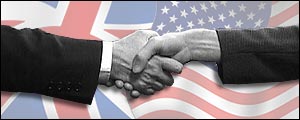The Price of "The Special Relationship" is revealed! It's £8.
 The phrase is thought to have been first coined by Winston Churchill who said, "Neither the sure prevention of war, nor the continuous rise of world organization will be gained without what I have called the fraternal association of the English-speaking peoples ...a special relationship between the British Commonwealth and Empire and the United States.
The phrase is thought to have been first coined by Winston Churchill who said, "Neither the sure prevention of war, nor the continuous rise of world organization will be gained without what I have called the fraternal association of the English-speaking peoples ...a special relationship between the British Commonwealth and Empire and the United States.
But, whatever it’s origins, it is a relationship that no British Prime Minister has ever dared to break.
The greatest example of it was the love fest that existed between Margaret Thatcher and Ronald Reagan. He called her "the best man in England." She once said he was "the second most important man in my life."
Indeed, such is the need to preserve the special relationship in the minds of British politicians, that Blair became widely known as Bush’s poodle throughout the UK, when he decided to back the US President's disputed claim that Saddam Hussein might be harbouring Weapons of Mass Destruction and helped him to launch, what many in Britain believe, was an illegal war against Iraq.
Indeed, the disgust over the war led to the resignations of several of Blair’s ministers, most notably Robin Cook the Leader of the House of Commons and Clare Short his International Development Secretary.
Cook summed up the feelings of many in the Labour Party when he stated, "Only a year ago, we and the United States were part of a coalition against terrorism that was wider and more diverse than I would ever have imagined possible.
History will be astonished at the diplomatic miscalculations that led so quickly to the disintegration of that powerful coalition.
The US can afford to go it alone, but Britain is not a superpower.
Our interests are best protected not by unilateral action but by multilateral agreement and a world order governed by rules.
Yet tonight the international partnerships most important to us are weakened: the European Union is divided; the Security Council is in stalemate.
Those are heavy casualties of a war in which a shot has yet to be fired."
Blair accepted these heavy political losses as a price worth paying in order to preserve the special relationship that had saved the continent of Europe from the scourge of Nazism.
Many of us doubted the wisdom of his actions, but few could have doubted his sincere belief that the special relationship must be preserved at all costs.
And now, despite the enormous efforts of UK politicians of all political persuasions to maintain that relationship, a hole has appeared in the dam.
It was bound to happen eventually. For the special relationship was always a one way street, a sort of uneven love affair, in which Britain adored and the US accepted Britain’s adoration.
The caution of all British Prime Ministers when approaching her more powerful ally was the fear that one day we would make a demand too far, request a favour too many, name a price that the world’s sole hyper power was unwilling to pay.
Sadly the UK has, unwittingly, stumbled into that arena; we have named that price: and it is a price at which the richest country in the history of the world has balked.
It is £8.
This is the cost that all commuters in London pay in order to enter London’s Congestion Zone. But to the US Embassy, it is a charge too far. The US embassy is arguing that the congestion charge is a tax and as such should not apply to diplomats, whom it says are exempt. But the Mayor of London, Mr Ken Livingstone, contends that the charge is a payment for a service as it is aimed at reducing traffic, and should therefore be paid.
Such is the degree of rancour that has exploded between the two country's that Mayor Livingston launched an attack on the US Ambassador yesterday, accusing him of being a "chiselling little crook".
He said: "This is clearly a political decision. When British troops are putting their lives on the line for American foreign policy it would be quite nice if they paid the congestion charge."
Sadly, whilst acknowledging the heavy cost in human casualties paid by the British military in supporting the war in Iraq, there are some costs that even the new empire cannot afford to pay.
£8.























No comments:
Post a Comment